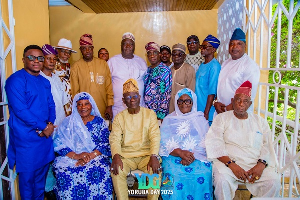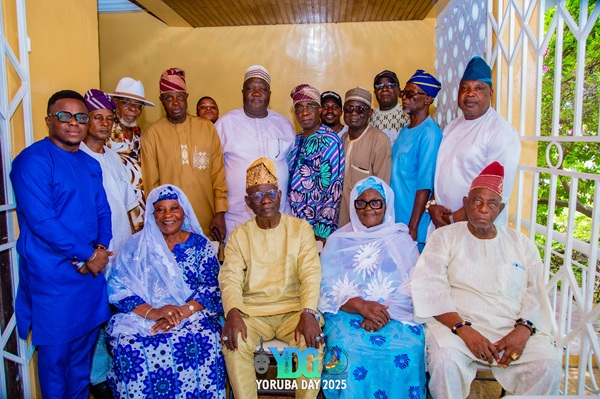 Some of the leaders from the Yoruba community
Some of the leaders from the Yoruba community
Alhaji Sidiku Buari, President Yoruba Council of Elders Ghana and a prominent figure within the Ghanaian community has described the upcoming Yoruba Day as a landmark event poised to strengthen cultural identity and unity among Yorubas living in the country.
Speaking after a courtesy visit from the leadership of the Yoruba Community in Ghana on Tuesday, June 17, Alhaji Buari emphasized the importance of preserving traditional values among Yorubas in the diaspora.
The delegation was led by Alhaji Chief Tunde Azeez, National President of the Yoruba Community in Ghana, alongside Alhaji Chief Fattau El Aziz, Chairman of the Yoruba Community Restructuring Committee, and Chief Alhaji Saeed Owolabi, The Aare Bobagunwa of Yoruba in Accra.
The visit is part of a broader effort to rally community leaders and build momentum ahead of Yoruba Day celebrations. It follows similar engagements with key traditional rulers including His Royal Majesty Oba Abdulsalami Amao Saka, the Olu of Kasoa and Paramount King of the Yoruba in the Central Region of Ghana, and HRM Alhaji Abdul Rasheed Brimah IX, the Paramount Oba of the Yoruba in Ghana.
“Yoruba Day is a special day for all Yorubas in Ghana,” Alhaji Buari said. “It’s not just a celebration; it’s a tool for preserving our culture and traditions. Yorubas have made significant contributions to Ghanaian society and beyond, and this event allows us to reflect on that legacy.”
He cited the global influence of the Yoruba people, particularly in the United States, where he noted individuals of Yoruba heritage have held prominent roles in finance and governance.
“Even though I was born in Ghana, I proudly embrace my Yoruba roots. That’s how I was raised, and I carry it with me every day,” Alhaj Buhari added.
On her part, Alhaja Adia Brimah, a respected community elder who was also present during the discussions, shared her thoughts on the cultural impact of the event on younger generations.
“Most of my children have not seen something like that before,” she noted. “When it is time, they come in. It showcases the culture of Yorubas and their traditions. So, what they wouldn’t know, they will get to know that on that day.”
She emphasized the deep-rooted pride and acceptance of Yoruba culture across the globe. “There is an adage that says, ‘If you travel to a place and you don’t find a Yoruba there, it’s better you pack your things and leave because the people there are not accommodating.’ Wherever you see Yorubas, you will find out that they’ve been accommodated. Their traditions and their culture have been inculcated in them and everybody accepts them.”
Alhaja Brimah also observed that Yoruba identity is unmistakable, even in subtle forms.
“There are some Yorubas here that may not know much about their culture and their traditions. You will see a Yoruba wearing a Ghanaian dress but she can never abandon her traditional wears—both for women and men. They wear it just to portray that they are Yorubas.
They will never leave that aside. It showcases their tradition and their culture, even in their languages.”
On the role of women in the celebration, she issued a heartfelt call to action: “I will encourage all the women in this country, when this Yoruba Day comes, to participate fully. So that we come together as one, we know each other, and we bring in love for each and every one of us.”
Alhaji Buari concluded by reiterating the potential of Yoruba Day to foster unity not just in Ghana, but among the wider diaspora.
“This celebration will not only bring together Yorubas in Ghana, but also connect us to our brothers and sisters in Nigeria. Our shared traditions are a powerful bond, and this event will help keep them alive.”
The Yoruba Day celebration is scheduled for September 28, 2025 and is expected to attract participants from across Ghana and Nigeria, underscoring the cultural and historical significance of the Yoruba people in West Africa.
Also present in attendance were several respected elders and executives of the Yoruba Community including; Chief Alhaji Musa Baba, Alhaja Mistura Ali, Alhaji Sumaila Yusuf, Alhaji Wahab Lawal, Alhaji Fatai Kareem, and Alhaji Jabar Adenrele.
Leading the Yoruba Community executives were Chief Alhaji Yahaya Babatunde Azeez (President), Chief Hon. Abukari Saeed Ibrahim (Organizing Secretary), Chief Tunde Idogbe (Oba Asa), Chief Najeem Dauda Justice (National PRO), and Hon. Bola Akinsanya (Assistant Secretary).
